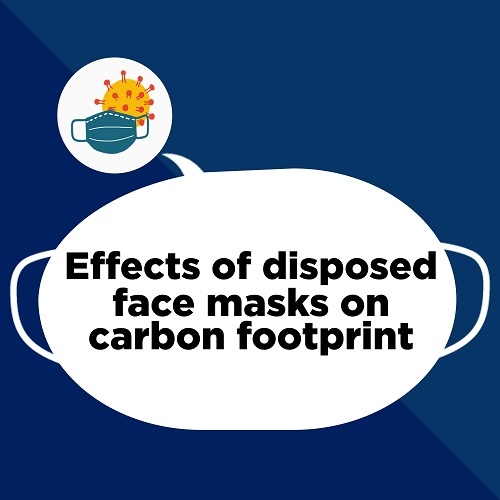I was walking back home from my daily stroll and much to my disgust amongst a pile of litter were two face masks discarded on the footpath. What struck me hard was not only the potential health risk of used masks being discarded like this during the pandemic but also the whole range of environmental issues created by people littering these non-biodegradable items as well as the long term impact their increased use is likely to have on our ecosystem
The demand for face masks from the public has been escalating as a result of the Indian government recommending their use. Also, the change in policy by the World Health Organization (WHO) advising that people should use face masks in places where social distancing isn’t possible will undoubtedly result in a massive increase in their number. Saikiran Kannan in his article ‘How Covid-19 renews the world’s plastic problem’ cited a report in which ‘estimated a need of 1 billion masks in Italy for the month of May soon after the lifting of its lockdown phase’. It went on to say that ‘If even only 1 percent of masks were discarded incorrectly’ and ended up as litter it would result in ‘10 million masks per month dispersed in the environment.’
The upsurge in face mask use has led to an alarming rise in personal protective equipment (PPE) including face masks used by the general public being thrown away on the streets, parks, and beaches instead of being put in a bin. In an interview on BBC of Jemma Bere, policy and research manager for Keep Wales Tidy, on the problem of face masks and littering said that “There is an environmental hazard because they contain plastic which is really damaging to our wildlife and our waterways.’ Apart from the significant danger to wildlife and public health, the BBC report identifies that it is having a direct impact on volunteers who would normally go and pick up litter on their daily walk avoiding doing so.
Worryingly there is already evidence of plastic pollution caused by masks. The OceansAsia team has reported finding masses of surgical masks washing up on the shoreline threatening the health of oceans and marine life.
There has been research carried out by several organizations on the impact of face masks on the environment. Eco chain, research identified that the CO2 footprint of a self-made cotton face mask is 20% higher than the footprint of a single-use plastic mask. This they stated was because the cotton fabric has a relatively high CO2 footprint throughout its production cycle. Although the researchers acknowledged that this does not give a complete picture because the use of the two kinds of masks is so different and it doesn’t take into account the number of single-use plastic face masks that would be used over a similar timespan to the life of a cotton mask. When they did carry out analysis over thirty days the results changed dramatically in favour of the cotton mask.
Research from a renowned Institute has also explored the environmental impact of single-use and various reusable face masks. Their Life Cycle Assessment showed that the use of reusable masks, including washing them, significantly reduces the amount of material ending up as waste. They point out that ‘66,000 tonnes of contaminated plastic waste and 57,000 tonnes of plastic packaging’ would be generated ‘if every one of us in India used just one disposable surgical mask each day for a year’. It concluded that single-use plastic masks would result in ‘ten times more climate change impact than using reusable cotton masks’.
From our review of various articles and reports of the environmental issues as a result of the increasing use of single-use face masks, I have identified that:
There is a climate change impact of using single-use plastic masks however it has to be acknowledged that some single-use face masks such as N95 respirators or their equivalent have an important role in protecting those at the greatest risk of infection.
More litter with the potential of plastics ending up in our oceans if single-use plastic masks are discarded or disposed off irresponsibly.
Contamination of recyclables will happen if the public puts face masks in recycling containers creating more waste.
A growth in waste for disposal or treatment will happen due to the increased use of single-use face masks and because many face masks contain materials that cannot be recycled or do not biodegrade.
If recycled cloth-based face masks are going to become a common accessory then guidance on how and when to disinfect them so that they can safely be reused is imperative as well as a concerted campaign to encourage their use over single-use plastic masks where appropriate.

